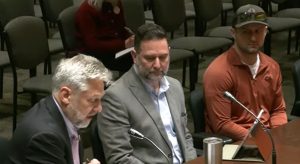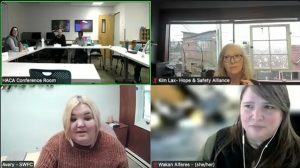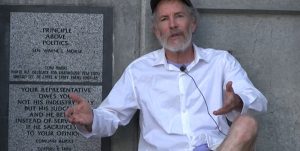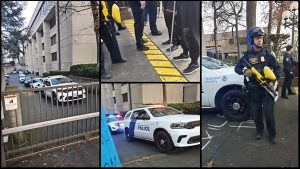ATU Local 757: Bus drivers deserve contract, high-visibility security team
10 min read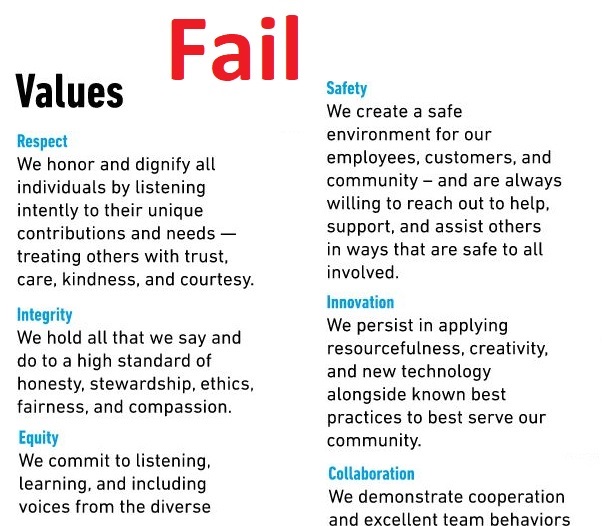
LTD drivers are hopeful that Jameson Auten can restore a culture of safety, starting with a new union contract. Speaking on her own behalf, and for Amalgamated Transit Union Local 757:
[00:00:12] Lynda Tucker: I love driving EmX. I don’t know why, I can’t explain it. But there’s just this thing about the timing of the lights and learning how to make it more efficient that I love about EmX.
[00:00:23] What I’ve done though is I’ve decided that I’m going to drive less EmX, and especially at night, because the later it gets, the worse it gets.
[00:00:31] I’ve driven an EmX that has been plumb full of people, and you’re just hoping nothing goes sideways until they start getting off the bus. Because they’re drunk, they’re high, maybe they’re homeless, maybe not.
[00:00:46] All I know is that I got this one group of two or three that got on and man, they seem like they’ve been partying, you know, and I have another group of two or three that get on and they sit off to the side and they make some comments ‘cause they’re drunk and stupid and you just hope you get to the spot where they get off.
[00:01:06] I’ve been in that situation. You just hope you get to the station and everybody gets off before something breaks.
[00:01:12] We have no idea how many criminals a day get on with a gun. We have people huffing, people smoking meth, heroin. You will not go a day on EmX without somebody getting on with a six- to 10-inch knife strapped to their hip, strapped to their backpack; a hatchet, because maybe they’re homeless or traveling, and that’s part of their pack. Should it be on the bus? Probably not.
[00:01:37] We have people get on all the time with a ‘staff,’ walking stick, you name it—baseball bats—and I think a lot of it is self-protection. It’s not true of everybody, but there is a lot of violence in our community and these people are walking around with baseball bats ‘cause they feel the need to protect themselves, but they’re also getting on our bus.
[00:01:57] So where do you draw that line? Yeah, we understand that you’re living on the streets or maybe you live in an area that isn’t so great and so you feel the need to carry around to protect yourself, but at what point is it dangerous ‘cause someone’s going to take it from you and use it on you? Or you bring it on the bus and all it does is escalate a situation that didn’t need to go there?
[00:02:16] I mean, it’s a pickle, I get it. How do you address it? Well, with the presence of security.
[00:02:22] John Q: Before becoming a bus operator, Lynda worked as LTD security.
[00:02:27] Lynda Tucker: It used to be the mantra, when I was security, ‘We are here to make everybody— not just the mom riding with the kid but the less fortunate riding the bus, the commuter riding the bus— we are here to make everybody feel safe and comfortable.’ And I don’t know where that went, but that is no longer the case.
[00:02:48] I had a gentleman board my bus one night that just started punching the bus and having a fit and I called for help. While trying to deal with that individual, I pull up to a platform and two more individuals get on, one screaming, being angry either about another rider, or angry about a policy, and there’s nothing you can do. We’re helpless out there.
[00:03:11] We’re not really supposed to engage people. And so when something’s happening on our bus, we’re told to sit in our seats and call it in, and whatever happens back there happens, and it is disheartening, it’s sad.
[00:03:27] We’ve had drivers intervene, which is against policy. They’ve left their seat. We had one driver stop one gentleman from beating up another, and that driver was suspended for getting out of his seat. Yes, he put himself in an unsafe situation, but what he’s supposed to do, watch an old guy get beat up?
[00:03:44] We’ve had another driver at a layover and the bus gets shot at, and, ‘Hey, sorry you got shot at, but could you just keep driving your bus?’ We’ve had other instances where a driver’s, like, ‘I’m pretty sure my bus was just shot at.’ And our Operations is like, ‘Ah, check out your bus for damage when you get to the stop, get to the station and just keep driving.’ I don’t even think the police were contacted. I don’t think they even asked any questions.
[00:04:07] I mean, there’s just such a disconnect. Management that’s been in place for years is out of touch with our community. They don’t work as though they believe in that mission.
[00:04:18] We have those little acrylic barriers they put up, basically, as glorified sneezeguards, when COVID came up and became a thing. So then when that driver got attacked, now your glorified sneezeguard is supposed to be your barrier of protection. Never mind that you can reach around it and open it. Not to mention, it messes with our right-side mirror visibility. We have this acrylic barrier and we have these mirrors out there on our right side, which by the way, quite often are the mirrors that allow us for—at least for EmX—to see out into traffic.
[00:04:51] So, these are the kind of things that we endure and meanwhile, we see what’s going on. Especially EmX. EmX is by far the bigger beast when it comes to seeing really how bad things are.
[00:05:04] You pay fare based on an honor system. I’ve had riders be like, ‘Oh, this is the first time I’ve ever been checked for fare.’ Our community readily tells new members to the community, be it unhoused members or low-income: ‘Oh, you can ride this bus for free. They’ll check you once in a while, but you’ll just have to get off.’
We hear these conversations on our bus. Driving down the road and you hear a conversation behind us, ‘Oh, just get on, this bus is free. They do sometimes check, but they’re just going to tell you to get off or have you pay fare then, but don’t worry, that doesn’t happen very often.’
[00:05:38] We have a plethora of people that are excluded from the bus. They’re excluded for a reason, whether it’s because they broke some minor offense on the Ordinance 36 (which is the ordinance the LTD has in place for basic rules of ridership) or they’re a person that was violent on the bus, or they did something to another person on the bus, or they’re a chronic fare evader that just happened to have got caught.
[00:06:05] Because LTD’s philosophy is, ‘Oh, that person’s excluded, oh, but are they behaving today? Well, we’ll just let ’em ride. You know? Just let us know when they get off.’ Ohhhhh. At some point that’s going to go sideways because this person was excluded for a reason.
[00:06:20] You’re not making everybody feel safe and comfortable. Do they know that person’s excluded? No, but the bus driver does and they’re distracted ‘cause they’re watching what this guy’s doing, who’s hopped seven seats in the two blocks he’s been on the bus, ‘cause you know he is excluded. So now it’s the bus driver’s job to make sure everybody’s feeling safe and comfortable while this guy hops around seven seats and does this and does that.
[00:06:43] John Q: Based on her experience as a Public Safety Officer, we asked Lynda how LTD could improve safety.
[00:06:49] Lynda Tucker: Visibility. Visibility of our public safety team, our supervisors. We have great people on our public safety team, but they are not utilized in a manner that is efficient or that allows them to be seen, in a manner that says, ‘Hey, we’re here and we’re here to make this a safe and comfortable environment.’
[00:07:09] I did security for LTD for eight and a half years, before it was in-house, when we were contracted. And it’s just that I see that they’re just underutilized.
[00:07:18] We know we have the ability for public safety officers to be mobile. I think a presence—you should be out being seen, stopping at stations, and walking a platform. That’s what our public safety should be for. We’re here to make you feel safe and comfortable. And I don’t know where we lost that, but we’ve lost it.
[00:07:37] We have people that have to take, you know, three, four, five, six buses a day to get to and from work, and now they’re like, ‘Nope, it’s too dangerous.’ We’ve had operators have discussions with people and they’re like, ‘Hey, my 41 bus will gets you there, but man, that EmX will gets you there in a third of the time.’ And they’re like, ‘Nope. Not taking that EmX, it’s not safe.’ Or ‘I have my kids, it’s not safe.’
[00:08:01] Yeah, there’s people that will not ride certain buses because of what’s happened or what they’ve seen, and they have flat said, ‘I’m not taking that. That’s not safe.’ And when we relay that information, nothing’s done with it. Nothing is done with it.
[00:08:15] John Q: Linda’s wife was driving an EmX bus when a 69-year-old Springfield man was brutally assaulted. Travis Allen Sanders later died from his injuries.
[00:08:26] Lynda Tucker: My understanding is there was a guy that tried to intervene and apparently he had two black eyes that damn near covered the full of his face and a big gash on his head. You know, he could have been hurt a lot worse than he was.
[00:08:37] And other assaults that have happened that aren’t even being brought to attention because they just get stuffed away. LTD doesn’t want the public to know, LTD doesn’t want it on the news. They don’t want it because they haven’t addressed them.
[00:08:51] You’re asking us to go out there every day, put ourselves at risk, every day, and you be so out of touch with the community and so out of touch and uncaring about the safety of both your riders and your drivers.
[00:09:05] How can LTD go forth and walk around this community and all these purple signs around Eugene and Springfield and brag about their mission statement with all these things going on, and then let their drivers go without some recognition in the form of a contract that shows that you understand what we’re going through.
[00:09:30] Read that mission statement, and then think about the fact that we’ve had a driver attacked. We’ve had a person killed on our bus, which—the effects of that are enormous.
[00:09:40] It’s enormous. You have the victim’s family, you have the victims that witnessed that on the bus. My wife included.
[00:09:49] She has managed through a few shifts and a few others she hasn’t been able to get through. It comes in waves. She has yet to sit in the driver’s seat of an EmX again, I don’t know when that’ll happen, but…
[00:10:00] The GM (and CEO Jameson Auten) called her, had a 15- or 20-minute phone call with her. He’s had meetings in person with her since, inquiring about how she’s doing, if she needs anything. Kudos to him. She’s drowning in well-wishes from our fellow drivers, some supervisors. But as far as upper management, that’s been it.
[00:10:22] I told our new GM in front of many other drivers, that we are cautiously hopeful and we are looking at you to come in here and get rid of the good-old-boy, get rid of the us-versus-them that exists here. Clean house and make this company whole, because somebody needs to do it. Because right now LTD scores a big F in character and integrity.
[00:10:50] As a company, as a bargaining unit, you refuse to sit down at the table and work out a deal that recognizes what you’re putting people through, not just to the drivers, but to their families.
[00:11:05] We’re going to drive around with ‘LTD is hiring’ all over our buses, but we’re not going to sit at a table and recognize via contract what we deal with on a daily basis, while you sit behind a desk and tell us about your policies and how great it is to ride the bus, how great they are.
[00:11:22] Great. We’re driving around some electric buses. That’s fantastic. Nobody’s going to be riding them ‘cause it’s not safe. Nobody’s going to be driving them because you’re not willing to sit down at a table and recognize us as a whole, that we are valued, by giving us a contract. Where’s the sense of community in that?
Lynda Tucker is speaking on her own behalf and for Amalgamated Transit Union Local 757, and is not representing any official positions of the Lane Transit District.

